英语故事-亡羊补牢
英语版中国成语故事亡羊补牢

英语版中国成语故事亡羊补牢:After an ox is lost, one repairs its stableOnce upon a time, a man had raised a flock of sheep. One morning, he found that a sheep was missing from the sheep. After careful searching, he found a big hole in the sheepfold, apparently that the cunning Wolf had crept in during the night and stolen the sheep. Seeing this, the neighbor kindly suggested him: " Please fix the sheepfold and plug the hole!"He turned a deaf ear and replied," What is the use of having the sheep lost?”However, the next morning, he found that the sheep had lost one more. It turned out that the Wolf had used the hole again, and secretly carried away another sheep.At this time, he was deeply regretful and regretted not following his neighbor's advice. So he immediately acted, quickly blocked the hole, and firmly repaired the sheepfold.From then on, the Wolf could no longer get into the sheep pen to steal.汉语版中国成语故事亡羊补牢:亡羊补牢从前,有位男子饲养了一群羊。
亡羊补牢的故事英文对照版
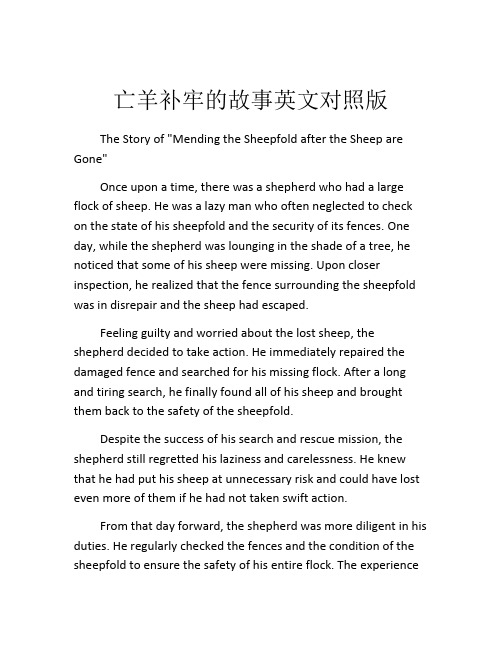
亡羊补牢的故事英文对照版The Story of "Mending the Sheepfold after the Sheep are Gone"Once upon a time, there was a shepherd who had a large flock of sheep. He was a lazy man who often neglected to check on the state of his sheepfold and the security of its fences. One day, while the shepherd was lounging in the shade of a tree, he noticed that some of his sheep were missing. Upon closer inspection, he realized that the fence surrounding the sheepfold was in disrepair and the sheep had escaped.Feeling guilty and worried about the lost sheep, the shepherd decided to take action. He immediately repaired the damaged fence and searched for his missing flock. After a long and tiring search, he finally found all of his sheep and brought them back to the safety of the sheepfold.Despite the success of his search and rescue mission, the shepherd still regretted his laziness and carelessness. He knew that he had put his sheep at unnecessary risk and could have lost even more of them if he had not taken swift action.From that day forward, the shepherd was more diligent in his duties. He regularly checked the fences and the condition of the sheepfold to ensure the safety of his entire flock. The experiencetaught him the value of being proactive, taking responsibility, and fixing problems before they become too overwhelming.The moral of this story is that prevention is always better than cure. As the saying goes, "an ounce of prevention is worth a pound of cure." It's important to take action and address problems as soon as they arise to avoid more significant consequences down the road.The concept of "mending the sheepfold after the sheep are gone" has become an idiom in English. It's used to refer to the act of fixing a problem after it has already caused damage or loss. The story of the shepherd and his flock serves as a warning to us all to pay attention to the details and take preventative measures to avoid potential problems in the first place.In conclusion, the story of "mending the sheepfold after the sheep are gone" highlights the importance of being proactive and responsible. Taking care of small problems before they become big is essential to success in all aspects of life. It's a valuable lesson that we can all learn from and apply to our daily lives.。
亡羊补牢的故事英文版概括
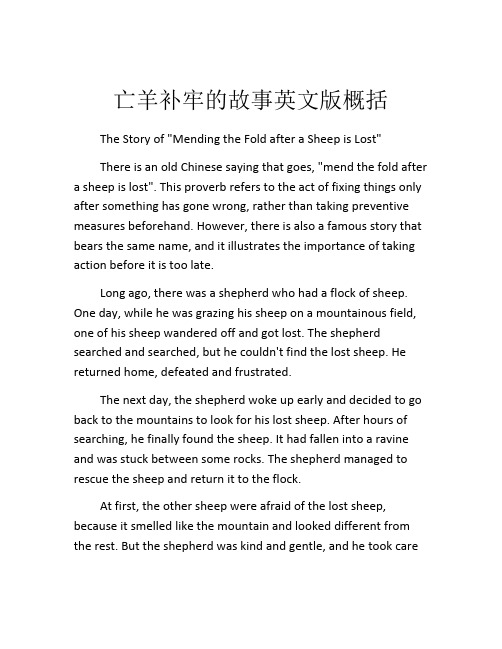
亡羊补牢的故事英文版概括The Story of "Mending the Fold after a Sheep is Lost"There is an old Chinese saying that goes, "mend the fold after a sheep is lost". This proverb refers to the act of fixing things only after something has gone wrong, rather than taking preventive measures beforehand. However, there is also a famous story that bears the same name, and it illustrates the importance of taking action before it is too late.Long ago, there was a shepherd who had a flock of sheep. One day, while he was grazing his sheep on a mountainous field, one of his sheep wandered off and got lost. The shepherd searched and searched, but he couldn't find the lost sheep. He returned home, defeated and frustrated.The next day, the shepherd woke up early and decided to go back to the mountains to look for his lost sheep. After hours of searching, he finally found the sheep. It had fallen into a ravine and was stuck between some rocks. The shepherd managed to rescue the sheep and return it to the flock.At first, the other sheep were afraid of the lost sheep, because it smelled like the mountain and looked different from the rest. But the shepherd was kind and gentle, and he took careof the lost sheep, washing it and feeding it until it was clean and healthy again.The other sheep were amazed by the shepherd's kindness and compassion, and they started to follow him wherever he went. They trusted him completely, and the shepherd took good care of his flock, always making sure that no sheep got lost again.The story of the shepherd and his lost sheep teaches us an important lesson about taking action before it's too late. We should not wait until something goes wrong to take preventive measures. Instead, we should be proactive and take all necessary steps to avoid problems.In our daily lives, we encounter many situations where we can apply this lesson. For example, we should take care of our health by eating a balanced diet and exercising regularly, instead of waiting until we get sick to seek medical attention. We should also be careful with our finances, saving money and investing wisely, instead of spending recklessly and ending up in debt.In conclusion, the story of "mending the fold after a sheep is lost" reminds us that prevention is better than cure. We should take action before it's too late, and not wait until something goes wrong to take measures. By being proactive, we can avoid problems and live a healthier, happier life.。
亡羊补牢英文版故事(一)
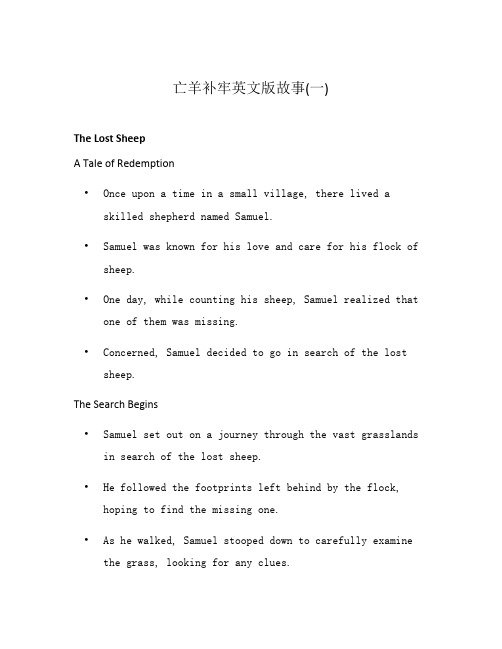
亡羊补牢英文版故事(一)The Lost SheepA Tale of Redemption•Once upon a time in a small village, there lived a skilled shepherd named Samuel.•Samuel was known for his love and care for his flock of sheep.•One day, while counting his sheep, Samuel realized that one of them was missing.•Concerned, Samuel decided to go in search of the lost sheep.The Search Begins•Samuel set out on a journey through the vast grasslands in search of the lost sheep.•He followed the footprints left behind by the flock, hoping to find the missing one.•As he walked, Samuel stooped down to carefully examine the grass, looking for any clues.•After hours of searching, he finally spotted the lost sheep stuck in a thorny bush.The Rescue Mission•Samuel quickly rushed to the rescue, carefullyuntangling the sheep from the thorns.•The sheep was scared and shaken but unharmed.•Samuel carried the sheep in his arms and gently consoled it, assuring it of safety.•With the sheep in his arms, Samuel made his way back to the village.The Lesson Learned•Upon returning to the village, Samuel realized the importance of diligence and taking immediate action.•He understood that if he had been more attentive earlier, the sheep wouldn’t have gotten lost i n the first place. •From that day on, Samuel vowed to be more vigilant in caring for his flock, never letting a sheep wander offagain.•He also shared his experience with the other shepherds, emphasizing the significance of proactive measures.Conclusion•The lost sheep incident became a turning point for Samuel and his fellow shepherds.•Together, they implemented a more robust system to ensure the safety and well-being of their beloved flock. •And as for the lost sheep, it found comfort and security back in the arms of Samuel, forever grateful for itsrescuer.Note: This story revolves around the theme of redemption and teaches us the value of beingresponsible and proactive in our actions.The Transformation•Inspired by the incident and the lessons learned, Samuel embarked on a personal transformation.•He became even more dedicated to his craft, studying and honing his skills as a shepherd.•Samuel implemented new strategies to prevent any future incidents of lost sheep.Innovation and Protection•Samuel designed a tracking system for his flock, using uniquely colored ribbons to identify each sheep.•He also built a stronger fence around the grazing area, ensuring the sheep would not wander off.•Additionally, Samuel trained his sheepdogs to be more vigilant, assisting him in keeping the flock safe. Sharing Knowledge•Samuel saw the importance of knowledge sharing and began conducting workshops for aspiring shepherds.•He taught them the importance of regular headcounts and how to identify signs of distress in their flock. •Samuel’s workshops became popular, and many shepherds from neighboring villages attended to learn from hisexpertise.The Impact•Samuel’s efforts and dedication paid off as incidents of lost sheep decreased significantly in his village. •The community praised his skills and admired his commitment to the safety of the flock.•Samuel became a respected figure, sought after for advice and guidance by fellow shepherds.The Legacy•Samuel’s legacy extended beyond his village. His story of redemption and innovation spread far and wide. •Other shepherds started adopting his tracking system and implementing proactive measures to protect their sheep. •Samuel’s teachings became a foundation for shepherding practices, ensuring the safety of flocks for generations to come.Conclusion•The incident of the lost sheep not only changed Samuel’s life but also had a transformative impact onshepherding as a whole.•His dedication, innovation, and knowledge sharing led to improved sheep management practices and a saferenvironment for the flocks.•Samuel’s story serves as a reminder to all of us that even in our mistakes, there is an opportunity for growth and positive change.。
小学一年级英语成语故事(带翻译)
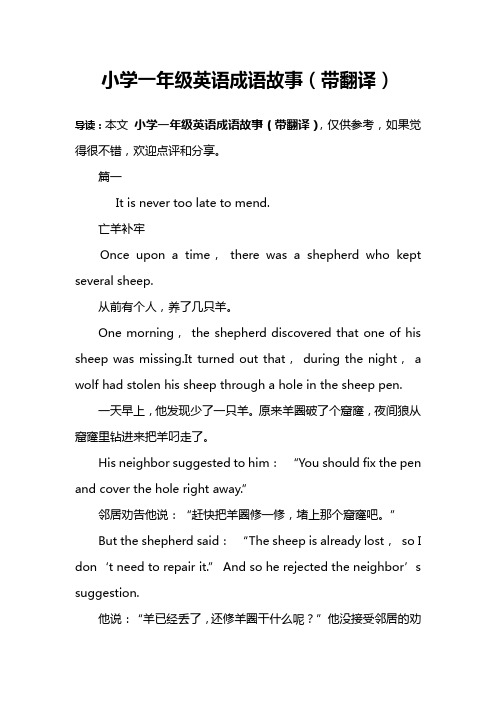
“笨鸟先飞”比喻了那些“本身资质可能稍逊于他人,但是靠加倍的努力赶上甚至是超过了别人”的人,英语中有一个意义相近的短语叫做“The early bird catches the worm.”,意思就是“早起的鸟儿有虫吃”,但是它并不强调这早起的鸟就是“笨鸟”,更多的强调了“勤能补拙”的意思。
The next morning, he discovered that another sheep was missing.Once again, the wolf stole the sheep through the hole in the fence.
第二天早上,他去放羊,发现又少了一只羊。原来狼又从窟窿里钻进来把羊叼走了。
所以,如果有一天你很早起床去学校,朋友很惊讶,问你:“Why are you so early?”那你就可以回答:“To catch worm.”(也就是自己把自己比喻成了“early bird”~)
树上一只鸟妈妈孵出了六只鸟宝宝,小六又瘦又小,哥哥姐姐们都欺负它;经常从它嘴里抢虫子,小六只得饿着肚子。
Sisters and Brothers call him “clumsy bird.”
哥哥姐姐们都叫他“小笨鸟”。
He determines to exercise more to be healthier, in order to not be laughed by his sisters and brothers.
去北京大学学习是我一生的梦想。我还喜欢北京的文化气氛和天气。我在北京简直就是如鱼得水。
篇三
The early bird catches the worm
笨鸟先飞
亡羊补牢故事的英语
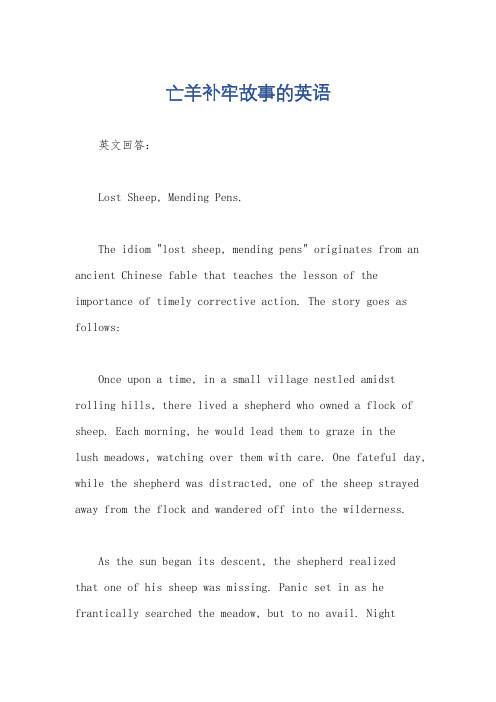
亡羊补牢故事的英语英文回答:Lost Sheep, Mending Pens.The idiom "lost sheep, mending pens" originates from an ancient Chinese fable that teaches the lesson of the importance of timely corrective action. The story goes as follows:Once upon a time, in a small village nestled amidst rolling hills, there lived a shepherd who owned a flock of sheep. Each morning, he would lead them to graze in thelush meadows, watching over them with care. One fateful day, while the shepherd was distracted, one of the sheep strayed away from the flock and wandered off into the wilderness.As the sun began its descent, the shepherd realizedthat one of his sheep was missing. Panic set in as he frantically searched the meadow, but to no avail. Nightfell, and the shepherd was forced to return to the village without the lost sheep.The following morning, the shepherd set out again, determined to find his lost charge. He searched high and low, but the sheep was nowhere to be found. Days turnedinto weeks, and still, the shepherd could not locate his missing animal.As time passed, the shepherd began to lose hope. He resigned himself to the belief that the sheep was gone for good. However, one day, while walking through a dense forest, he stumbled upon a clearing. To his astonishment,he saw his lost sheep grazing peacefully in the meadow.Overjoyed, the shepherd ran towards his precious animal, eager to bring it back to the safety of the flock. However, as he approached, he noticed something peculiar. The sheep had several large thorns stuck in its wool. The shepherd carefully removed the thorns and examined the sheep's wounds. To his surprise, the wounds were already beginningto heal.The shepherd realized that, even though the sheep had been lost in the wilderness for so long, it had managed to survive. The thorns had caused pain and discomfort, but they had also served as a reminder of the importance of seeking shelter and protection.From that day forward, the shepherd made sure to keep a closer watch over his flock. He also mended the fences around the meadow, ensuring that none of his sheep would be able to stray away again. The fable of the lost sheep, mending pens, teaches us that it is never too late to take corrective action. Even when we have lost our way or made mistakes, we can always find a way to heal our wounds and make things right.中文回答:亡羊补牢。
亡羊补牢英语小故事带翻译
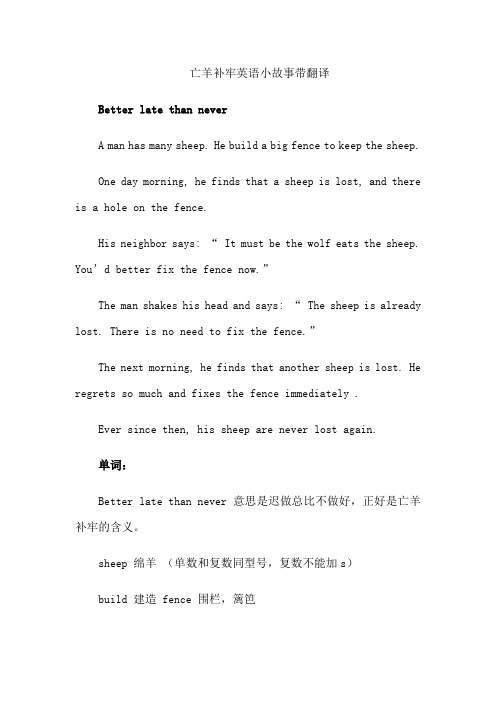
亡羊补牢英语小故事带翻译Better late than neverA man has many sheep. He build a big fence to keep the sheep.One day morning, he finds that a sheep is lost, and there is a hole on the fence.His neighbor says: “ It must be the wolf eats the sheep. You’d better fix the fence now.”The man shakes his head and says: “ The sheep is already lost. There is no need to fix the fence.”The next morning, he finds that another sheep is lost. He regrets so much and fixes the fence immediately .Ever since then, his sheep are never lost again.单词:Better late than never 意思是迟做总比不做好,正好是亡羊补牢的含义。
sheep 绵羊(单数和复数同型号,复数不能加s)build 建造 fence 围栏,篱笆keep 养着,保留,保持find 发现 be ( am, is , are) lost 丢失了hole 洞,窟窿 neighbor 邻居must be 一定 wolf 狼‘d better=would better 最好fix 修理 shake 摇already 已经 need 需要there is no need 没必要another 另一个 regret 后悔so much 非常(放在动词后面用来形容动词)immediately 立刻,马上ever since then 从那以后never 从没有,从不 again 再,又译文:一个人有很多羊。
英语作文中国故事亡羊补牢80词
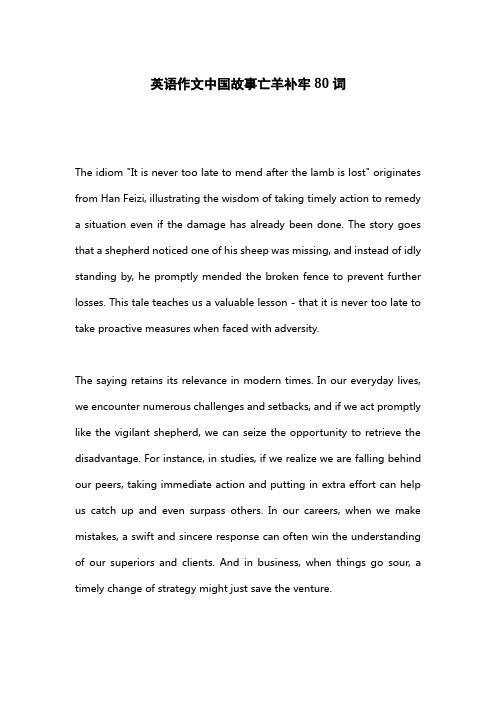
英语作文中国故事亡羊补牢80词The idiom "It is never too late to mend after the lamb is lost" originates from Han Feizi, illustrating the wisdom of taking timely action to remedy a situation even if the damage has already been done. The story goes that a shepherd noticed one of his sheep was missing, and instead of idly standing by, he promptly mended the broken fence to prevent further losses. This tale teaches us a valuable lesson - that it is never too late to take proactive measures when faced with adversity.The saying retains its relevance in modern times. In our everyday lives, we encounter numerous challenges and setbacks, and if we act promptly like the vigilant shepherd, we can seize the opportunity to retrieve the disadvantage. For instance, in studies, if we realize we are falling behind our peers, taking immediate action and putting in extra effort can help us catch up and even surpass others. In our careers, when we make mistakes, a swift and sincere response can often win the understanding of our superiors and clients. And in business, when things go sour, a timely change of strategy might just save the venture.The spirit of "mending the loopholes" is a valuable trait we should all cultivate. It encourages us to face problems head-on and take timely action. Additionally, we should learn from our mistakes, prepare for eventualities, and develop strategies to prevent similar occurrences in the future.“亡羊补牢,未为迟也。
- 1、下载文档前请自行甄别文档内容的完整性,平台不提供额外的编辑、内容补充、找答案等附加服务。
- 2、"仅部分预览"的文档,不可在线预览部分如存在完整性等问题,可反馈申请退款(可完整预览的文档不适用该条件!)。
- 3、如文档侵犯您的权益,请联系客服反馈,我们会尽快为您处理(人工客服工作时间:9:00-18:30)。
英语故事
亡羊补牢
亡羊补牢中文亡羊补牢
战国时代,楚国有一个大臣,名叫庄辛,有一天对楚襄王说:“你在宫里面的时候,左边是州侯,右边是夏侯;出去的时候,鄢陵君和寿跟君又总是随看你。
你和这四个人专门讲究奢侈淫乐,不管国家大事,郢(楚都,在今湖北省江陵县北)一定要危险啦!”
襄王听了,很不高与,气骂道:“你老糊涂了吗?故意说这些险恶的话惑乱人心吗?”
庄辛不慌不忙的回答说:“我实在感觉事情一定要到这个地步的,不敢故意说楚国有什么不幸。
如果你一直宠信这个人,楚国一定要灭亡的。
你既然不信我的话,请允许我到赵国躲一躲,看事情究竟会怎样。
”
庄辛到赵国才住了五个月,秦国果然派兵侵楚,襄王被迫流亡到阳城(今河南息县西北)。
这才觉得庄辛的话不错,赶紧派人把庄辛找回来,问他有什么办法;庄辛很诚恳地说:“我听说过,看见兔子牙想起猎犬,这还不晚;羊跑掉了才补羊圈,也还不迟。
……”
是一则很有意义的故事,只知道享乐,不知道如何做事,其结果必然是遭到悲惨的失败无疑。
“亡羊补牢”这句成语,便是根据上面约两句话而来的,表达处理事情发生错误以后,如果赶紧去挽救,还不为迟的意思。
例如一个事业家,因估计事情的发展犯了错误,轻举冒进,陷入失败的境地。
但他并不气馁,耐心地将事情再想了一遍,从这次的错误中吸取教训,认为“亡羊补牢”,从头做起,还不算晚呢!
亡羊补牢英文It is not too late to mend the fold even after some sheep have been lost
A man who raised sheep once noticed there was a hole in the walls of his sheepfold. But he neglected to repair it. A few days later, several sheep were missing. His friend advised him: “It is not too late to mend the sheepfold.”
“Wang Yang Bu Lao” or “Mending the sheepfold after the sheep have been stolen” advises us that even though we have suffer a loss, it is never too late to take steps to prevent
further losses.。
